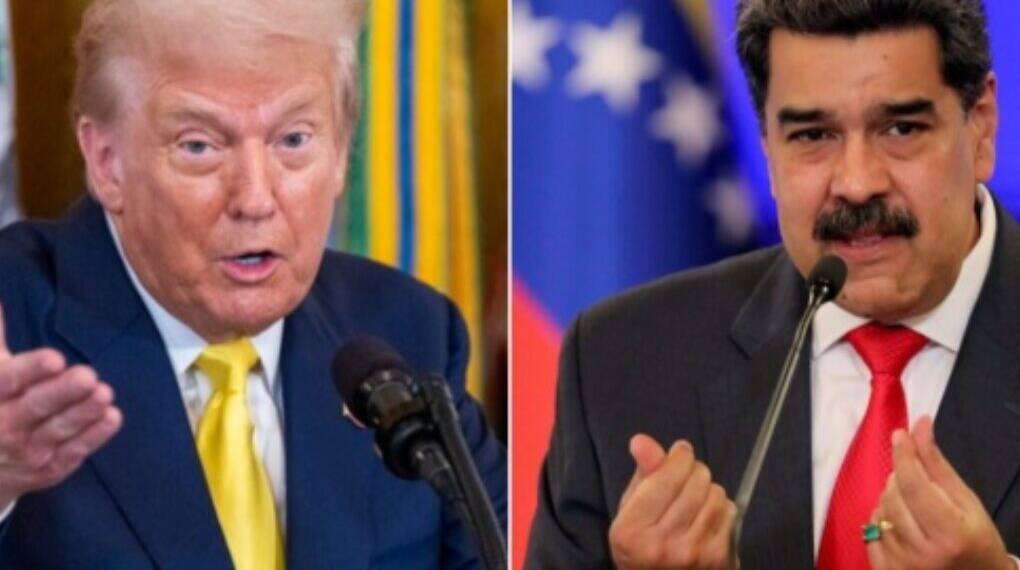Tensions in the Caribbean reached a boiling point Monday as Venezuela claimed to have foiled a CIA-financed “false flag” plot aimed at attacking a U.S. warship near its territorial waters. The accusation comes as the United States expands its military presence in the region, flying strategic bombers close to Venezuelan airspace and deploying additional naval assets under President Donald Trump’s renewed anti-narcotics campaign.
The Alleged Plot
According to Venezuelan Interior Minister Diosdado Cabello, security forces arrested four individuals allegedly linked to a CIA operation designed to strike the USS Gravely, a guided-missile destroyer that docked in Trinidad and Tobago on Sunday. Cabello claimed the attack was meant to frame Caracas and provide Washington with a pretext for military intervention.
“The operation was orchestrated and financed by the CIA,” Cabello declared on national television, though he provided no direct evidence. Venezuelan authorities described the alleged plan as a “false flag operation”—a deceptive act meant to justify retaliation or invasion.
The USS Gravely’s arrival in Port of Spain, within striking distance of Venezuela’s coast, has been viewed by Caracas as a provocation. President Nicolás Maduro quickly condemned the U.S. move as an “aggressive act,” accusing Washington of seeking to fabricate a conflict in the Caribbean.
Diplomatic Fallout and Economic Retaliation
In retaliation, Maduro announced the suspension of a key gas agreement with Trinidad and Tobago, accusing Prime Minister Kamla Persad-Bissessar of “transforming her nation into an aircraft carrier for the American empire.”
Persad-Bissessar dismissed the allegations as “blackmail,” stating that Trinidad’s cooperation with the U.S. is focused on security and anti-narcotics operations. “We remain committed to regional stability and transparency,” she said.
Relations between Caracas and Port of Spain have deteriorated sharply since Washington granted Trinidad and Tobago permission to develop the Dragon Gas Field, a lucrative offshore reserve located in Venezuelan waters. The move, made despite ongoing U.S. sanctions on Venezuela, further deepened distrust between the neighboring nations.
U.S. Military Escalation in the Caribbean
The alleged CIA plot coincides with a massive U.S. military buildup across the Caribbean basin. Under President Trump’s intensified campaign against narcotics trafficking, the Pentagon has deployed seven warships to the region, with an eighth vessel operating in the Gulf of Mexico.
The U.S. Navy’s most powerful vessel, the USS Gerald R. Ford, is also expected to arrive in the coming weeks, accompanied by a full carrier strike group, fighter aircraft, and submarines.
Adding to the tension, two B-1B Lancer bombers were tracked flying parallel to Venezuela’s coastline on Monday — the third such bomber mission in as many weeks. According to publicly available flight data, the bombers took off from Minot Air Force Base in North Dakota before disappearing from radar near the Caribbean Sea.
U.S. defense officials have described these missions as “routine deterrence patrols,” but Venezuelan military analysts view them as “psychological warfare.”
Washington’s Position and CIA Involvement
The White House and Pentagon have not directly commented on Venezuela’s allegations of a CIA-financed plot. However, Defense Secretary Pete Hegseth confirmed ongoing U.S. “counter-narcotics” operations in the region, acknowledging that ten maritime strikes had been carried out since September.
According to the Pentagon, these actions targeted vessels involved in drug trafficking, but critics have questioned the legality of such operations. Independent reports claim at least 43 fatalities have resulted from the strikes, with little verifiable evidence linking the targets to narcotics networks.
In September, President Trump publicly confirmed that he had authorized CIA operations in Venezuela, arguing that “Maduro’s criminal regime must be dismantled.”
Political Reactions and Escalation Risks
Venezuela’s Vice President Delcy Rodríguez reiterated the government’s claim that U.S. and CIA-backed operatives had been planning to “stage an attack” on American assets to justify military retaliation. “They seek to manufacture a crisis that could plunge the entire Caribbean into war,” Rodríguez said.
Meanwhile, senior U.S. lawmakers have intensified rhetoric against the Maduro regime. Senator Lindsey Graham stated that “Maduro’s days are numbered,” while Senator Rick Scott suggested the Venezuelan leader should “flee to China or Russia because the U.S. is planning something big.”
These statements, coupled with the deployment of bombers and destroyers, have amplified fears that Washington is preparing for a military showdown with Caracas.
Energy, Politics, and Power
Analysts believe the escalating standoff extends far beyond allegations of drug trafficking. Venezuela holds some of the largest proven oil and gas reserves in the world, and control over energy corridors in the southern Caribbean is seen as a major strategic objective.
Washington’s decision to let Trinidad exploit Venezuelan gas fields has been interpreted by many in Caracas as a deliberate effort to isolate Maduro economically. The suspension of the bilateral gas deal is therefore both a retaliatory and symbolic move, signaling Venezuela’s intent to resist U.S. encroachment.
Political observers argue that Trump’s tough stance on Venezuela may also serve a domestic purpose — projecting strength on foreign policy ahead of the 2026 midterm elections.
Regional and Global Implications
The situation has also drawn attention from Russia, China, and Cuba, longtime allies of Venezuela. Moscow’s Foreign Ministry warned on Tuesday that “any U.S. military aggression against a sovereign Latin American state will have consequences.”
Beijing, though more cautious, expressed “deep concern” over “unilateral actions threatening regional peace.”
Caracas has long relied on military and intelligence cooperation with both Russia and China, including the deployment of radar systems, anti-aircraft defenses, and cyber intelligence tools.
Should the U.S. escalate operations further, analysts warn the Caribbean could become a new Cold War theater, pitting U.S. power against a coalition of anti-Western allies.
Uncertain Future
For now, the USS Gravely remains docked in Port of Spain for joint exercises with Trinidad’s defense forces, while Venezuela’s military stays on high alert.
As bombers fly overhead and accusations of CIA plots fill the airwaves, the prospect of a regional conflict grows more tangible by the day.
Whether this confrontation ends in diplomacy or disaster may depend on what happens in the shadows — in the intelligence war now playing out across the Caribbean.








